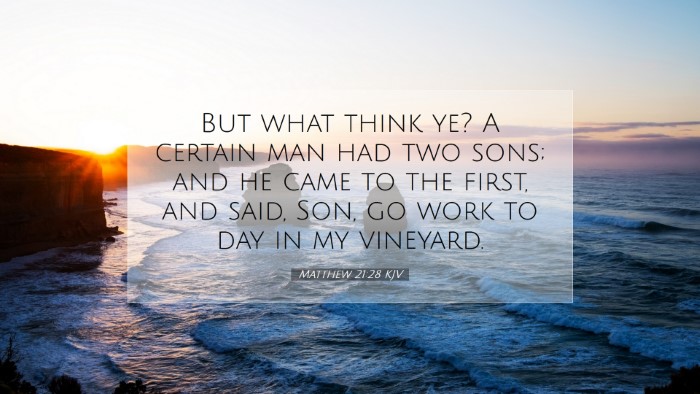Matthew 21:28 - Commentary and Insights
The verse Matthew 21:28 states: "But what think ye? A certain man had two sons; and he came to the first, and said, Son, go work to day in my vineyard." This passage is part of a larger discourse where Jesus uses parables to convey profound truths about obedience, repentance, and the nature of God's kingdom. The insights derived from public domain commentaries illuminate the significance of this verse, making it applicable to various aspects of Christian life and theology.
Context and Background
This parable occurs shortly after Jesus' triumphal entry into Jerusalem and subsequent cleansing of the temple. He is speaking to the religious leaders of His day, who had authority but often failed to act in accordance with God's will. The immediate context suggests that Jesus is challenging the Pharisees and Sadducees to reflect on their own response to God's call compared to the responses of the sinners and publicans they scorned.
Analysis of the Characters
The parable features a father and his two sons, symbolizing the choices and responses of individuals to God’s commands.
-
The Father: Represents God, who issues commands with authority and expectation. He symbolizes parental love and discipline, illustrating God's desire for obedience from His children.
-
The First Son: Initially refuses his father's command, embodying those who resist God's call yet may later repent and fulfill His will. His change of heart is crucial, representing the possibility of redemption.
-
The Second Son: Claims he will obey but ultimately does not. This character reflects hypocritical faith, where outward compliance is displayed, but true obedience is absent.
The Theme of Repentance
Matthew Henry remarks on the importance of genuine repentance, suggesting that the first son’s initial refusal but ultimate compliance points to the active nature of repentance and the grace of God that leads to transformation. True repentance is not merely about regret but involves a tangible change in actions and attitudes.
Adam Clarke emphasizes that Christ's parable conveys how the publicans and sinners, who were initially disobedient, turned back to God. Their acceptance of Jesus represents a profound faith that the religious leaders lacked despite their outward show of devotion.
Obedience and Action
The request from the father to "go work" details the expectation that faith must result in action. Albert Barnes explains that simply proclaiming adherence to God's will without corresponding actions is empty. The essence of Christianity is not found in mere verbal commitment but in the genuine effort to carry out God's work.
Application to the Contemporary Church
This parable serves as a cautionary tale for the modern church, urging a reflection on personal authenticity in faith and actions. It challenges pastors, scholars, and believers alike to evaluate whether their expressions of faith are substantive or merely superficial.
-
Leaders and Hypocrisy: Just as the second son represents hypocritical leaders, those in positions of authority must strive for congruence between belief and behavior.
-
Grace and Redemption: The first son serves as a reminder that God’s grace is available to all—regardless of past disobedience—as long as there is true repentance.
-
Faith's Fruits: Authentic faith will produce fruit, and believers are called to examine if their professions result in tangible service to others and to God.
Conclusion
The parable encapsulated in Matthew 21:28 reminds all believers of the importance of authentic response to God's call. It urges us to evaluate our responses in light of God's expectations, emphasizing that the journey of faith is marked by both challenges and opportunities for growth. As theologians, students, and pastors reflect on this passage, may they find in it a source of encouragement to pursue a life characterized by true obedience, repentance, and active service in the vineyard of the Lord.


